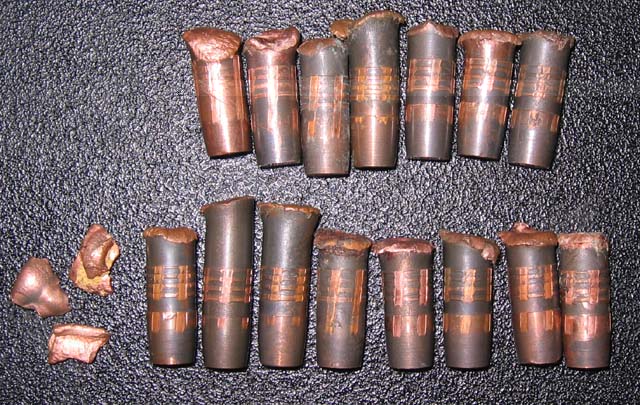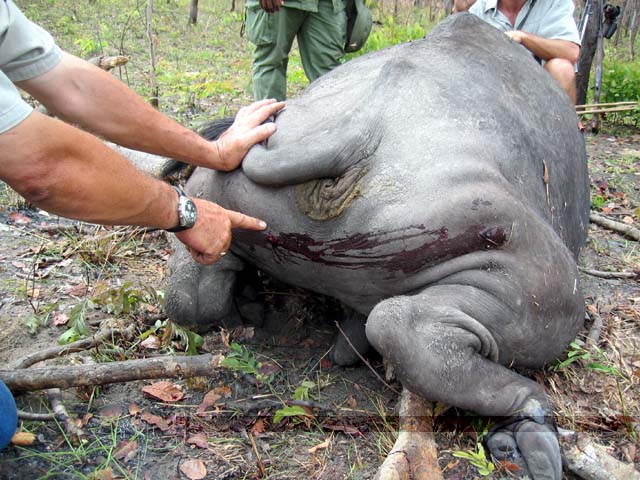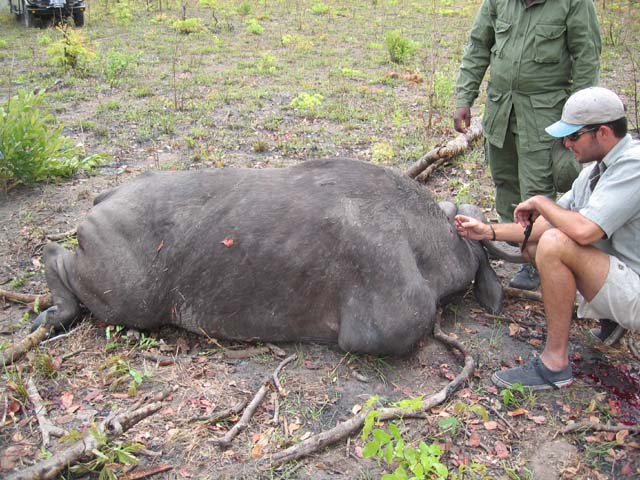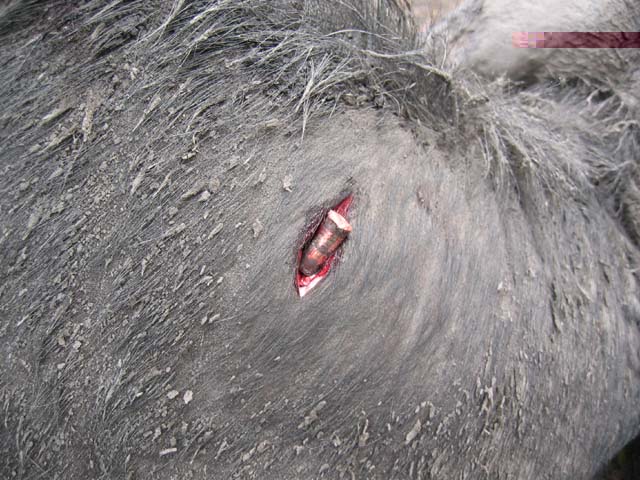

 The Accurate Reloading Forums
The Accurate Reloading Forums  THE ACCURATE RELOADING.COM FORUMS
THE ACCURATE RELOADING.COM FORUMS  Hunting
Hunting  African Big Game Hunting
African Big Game Hunting  Recovered Walterhog Bullets
Recovered Walterhog BulletsGo  | New  | Find  | Notify  | Tools  | Reply  |  |
| Administrator |
Ladies and Gentlemen,  These are the bullets we managed to recover from teh buffalos we have shot in Tanzania. We were unable to recover any of the bullets shot into the animals standing broadside. All bullets were loaded to have a velocity of 2790 fps, using 88 grains of H4350, shot in the 375/404 rifle. One bull was shot while standing broadside, at around 100 yards. The bullet broke both his shoulders, and as he dropped, he turned away from us. Another shot was fired, hitting him in the rear left leg. The bullet penetrated to half way up his neck on his right side. | ||
|
| one of us |
Glad to have you back!!! The bullets look like they performed good. Spoke to Alan just a few minuts ago and said that he had a great time and is home fine. He will be in town til tuesday. | |||
|
| one of us |
Saeed, Welcome back, again, and thanks for all the entertainment and education available here! Your Walterhog Bullets seem to have the terminal performance of a GSC FN, with the added splash of fragments from the hollowpoint. Old Gerard would never supply his .375 bullets in 300 grains, but you have proven how effective the 300 grain Walterhog Bullet in .375 caliber can be. Looks like you coud brain shoot elephants or use as a soft on light game. Maybe the ultimate KISS principle Load for the ultimate Kiss principle cartridge, the .375/404. And thanks for the load data, and admitting that you do actually find a use for velocity over 2400 fps. High velocity and mild pressure. Cheers! | |||
|
| Moderator |
Awesome! I am glad your Walterhog bullets worked out so well. Pretty tough to beat that kind of penetration. I can only imagine what Walter has to say about the deep penetration of Walterhog bullets. The recovered slugs actually look an aweful lot like a 416 GSC HV that I watched DonG pull out of an eland.  As far as I am concerned, bullet performance of that magnitude is phenomenal, and something to be proud of. Glad to have you back, Saeed. Cheers, Chris [ 09-14-2003, 00:05: Message edited by: Canuck ] | |||
|
| one of us |
/ | |||
|
| Administrator |
Canuck, Thank you very much my friend. Some photos of the buffalo.   My friend Alan Vincent holding the bullet.  Where it ended, under the skin of the neck. [ 09-14-2003, 11:32: Message edited by: Saeed ] | |||
|
| one of us |
Gents, Is that a small buf' ? Seems "not so large" by the perspective of the pic. Coming from cattle country I have seen much bigger bulls locally. Now they may or may not match up for attitude but judging by that one buf' they are bigger here. 45nut | |||
|
| one of us |
Hi Walter's bullets look like Barnes without X.verry genital danny | |||
|
| Administrator |
45nut, Actually, we noticed that those buffalo were larger in body than the ones we shot in Chete in Zimbabwe. At least that is the conclusion both myself and Alan Vincent came to. He is PH in Zimbabwe. | |||
|
| one of us |
Gentlemen I have a question relating to the solids. If a solid impacts at 2,000 fps is there a noticable difference when, say the it impacts at 2,800 fps? Would the solids, that Saeed had photos of, been less damaged had they been moving slower? I seem to remember an article in Guns and Ammo that complained about the solid fired in a 460 Weatherby 'riviting' or breaking up when it performed as designed when shot from a 458 Winchester. Jim | |||
|
| one of us |
Uh, arkypete, the Walterhog is a softpoint and is suppoded to open up. It does, then becomes like a solid after the entry explosion. | |||
|
| one of us |
HI, I have not been here for awhile, but where is the web site for Walterhog bullets, and ALF HC will penetrate just fine, although I prefer my 50 cal over the 4570. Thanks,Kev | |||
|
one of us |
Well, that buffalo now has two a-holes! Great pics Saeed, Mabrouk! | |||
|
| Moderator |
quote:Kev, Saeed makes those bullets himself; they are not available commercially. We never heard how your .50-110 is working out. How does it shoot? George | |||
|
| one of us |
HI, Thanks George for asking, better than I thought, it is very accurate and I easly got 2200 fps with a 525 grain bullet. I am working on a 570 grain which I am sure I can get betwween 2050-2100 fps,Thanks,Kev | |||
|
| Moderator |
Saeed, Those pictures are very impressive. How far would you guess that penetration was? 4 feet? Pretty tough to beat, anyway! Cheers, Canuck | |||
|
| one of us |
DaggaRon Thank you for pointing the Walterhog bullets are soft points. I'm guessing that they are a take off on the H-mantle or Nosler partition? My question remains does the velocity have any effect on how well the solids perform? Jim | |||
|
| one of us |
Jim, You must have missed the much ballyhooed story of these bullets. "Supposed" to be made of solid copper, monometal. Looks like they were moly coated before the abrasive innards of the buffalo and rifling took off most of the moly. Do a search on "Walterhog bullets" and you will learn of Saeed turning these out himself, using only a CNC lathe/machinery and his own cotton picking hands. I don't for a moment believe that Walter is involved at all! As for the velocity issue: I will leave that for the "experts" to discuss again. | |||
|
| one of us |
arkypete, The results that Saeed is getting with his "home made" bullets are very predictable, to me. We manufacture bullets that are very similar to Saeeds home made bullets. Here is a picture of one of our bullets.  As you can see the front petals came off, by design, at high velocity. We have tested our bullets at low velocity and penetration was about the same as when driven at high velocity. Here is the data of our penetration tests using the same bullet (30EXP) at 2 different velocities. Both tests were conducted at 100 yards from the muzzle. We shot into 1 gallon metal cans filled with water, caps secured, spaced 1" apart, in a line. 300 win mag 79gr of Rel 22 3377 FPS average, 10 feet from the muzzle 159gr EXP Groove Bullet The bullet went completely through 7 cans and the back of the bullet was recovered inside the 8th can. The petals were found inside the 2nd and 3rd can. The bullet looked almost identical to the Groove Bullet shown in the picture above. 30-06 22gr of SR4749 1808 FPS average, 10 feet from the muzzle 159gr EXP Groove Bullets The bullet went completely through 7 cans and dented the front of the 8th can. The recovered bullet was then weighed and retained 100% of its original weight. I don't have a picture of it to show you, yet. The bullets shape: It looked like somebody took a hammer and smashed the nose of the bullet back about .030". Other then that the bullet looks like an unfired bullet (aside from the rifling marks). I hope this answers your question. Don | |||
|
| one of us |
Gentlemen Thank you both for filling me in on the Walterhog bullet by Saeed. I have read about the various 'solids' copper tubing, swaged heavy jackets, mono-metal, etc. The one I found most intriguing was the copper/bronze with a steel inner jacket and lead core. It sounded like an antitank round. I believe some one even made a tungston core bullet. According to Dave Corbin it's possible to swage a solid bronze bullet. What's the advantage of turning a bullet rather swaging, excepting the grooved bullet, Jim [ 09-18-2003, 03:28: Message edited by: arkypete ] | |||
|
| one of us |
arky, A turned bullet is going to be concentric, every time, allowing for excellent balance about the center axis. If you have the means, check the distance from the base of a swaged bullet to the start of the ogive. This same distance on a turned bullet, depending on geometry, is very constant. If this distance varies so does the distance the bullet is seated off the lands. Not a good situation for repeatable accuracy. As you said, configurations are easier to obtain for a turned bullet. These are some advantages. Don | |||
|
| one of us |
Arky, Another advantage of a turned bullet versus a swaged bullet is that you don't have to buy in "lot numbers" with a turned bullet. Don | |||
|
| Powered by Social Strata |
| Please Wait. Your request is being processed... |
|
 The Accurate Reloading Forums
The Accurate Reloading Forums  THE ACCURATE RELOADING.COM FORUMS
THE ACCURATE RELOADING.COM FORUMS  Hunting
Hunting  African Big Game Hunting
African Big Game Hunting  Recovered Walterhog Bullets
Recovered Walterhog Bullets

Visit our on-line store for AR Memorabilia

